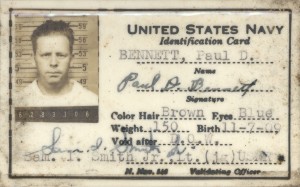Members Of Military Particularly Vulnerable To Identity Theft

Navy ID card (Photo credit: Lee Bennett)More and more states as well as the federal government are taking steps to protect military personnel and their family members from identity theft.
That’s because it’s becoming more and more of a problem.
“When your day job is protecting our country, you shouldn’t have to worry about being attacked by identity thieves,” according to an item on the website of the North Carolina Department of Justice. “Members of the U. S. military can take preemptive action to minimize the risk of becoming an identity theft victim. Security freezes and active duty alerts are two of the weapons that can be deployed in this fight, but utilizing both at the same time could lead to unnecessarily complications.”
Legislators in Ohio recently passed, and the governor signed, a measure that establishes harsher penalties for identity thieves when their targets are active-duty service members and their spouses.
“These changes will make Ohio one of the toughest states for punishing felons who commit identity fraud against active-duty service members,” Attorney General DeWine was quoted as saying in a press release. “I applaud the governor and the General Assembly for recognizing the importance of this issue. Military service members and their families sacrifice so much to protect our country, and it’s our job to do all we can to protect them.”
The Federal Trade Commission offers a brochure to help military personnel and their families deal with identity theft.
“Identity theft is a serious crime,” the FTC notes. “It can disrupt your finances, credit history and reputation, and take time, money and patience to resolve.
“The rigors of military life can compound the problems that identity theft creates.”
One of the suggestions offered in the brochure is for service men and women to place an “active-duty alert” on their credit reports when they are on deployment.
“The alert requires creditors to take steps to verify your identity before granting credit in your name,” the brochure indicates. “It lasts for a year but can be renewed.”
